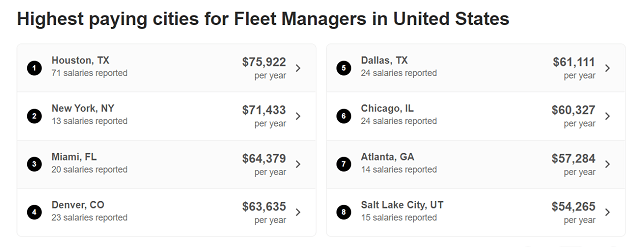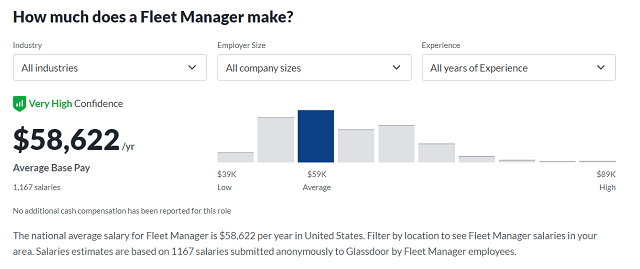Fleet managers are responsible for overseeing the use and maintenance of a group of vehicles, which can include trucks, cars, vans, trains, airplanes, or a combination of various types of vehicles used to transport people or goods. A key component of logistics, fleet management is costly and complex, with a variety of considerations such as costs, operational efficiency, fuel management, fleet maintenance, safety, and regulatory compliance. Fleet managers are dedicated and experienced professionals responsible for the broad oversight and day-to-day management of a fleet of vehicles. These professionals are employed across a variety of industries, from commercial trucking operations to logistics companies, public sector organizations, and more.
We’ve put together this comprehensive guide to provide insights into the education, work experience, skills, and characteristics required for success as a fleet manager. In addition, we’ll take a look at where fleet managers work and what highly qualified fleet managers can expect to earn in various industries and geographic regions:
Keep reading to learn more about the role of a fleet manager and what it takes to succeed in the field.

There’s a lot that goes into maintaining a fleet of vehicles. Companies that operate fleets have to develop processes for managing maintenance activities, controlling costs, managing fuel requirements, scheduling vehicles and planning routes, and a variety of other tasks to ensure operational efficiency. While there are often multiple roles involved in managing a fleet, a fleet manager oversees all activities related to the company’s fleet, communicating with both higher-ups and lower-level staff members to coordinate fleet management activities.
Fleet Managers can have various job titles, including job titles that indicate seniority as well as other variations, such as:
In some companies, multiple fleet management professionals fill various roles and work as part of a team to coordinate the management of the company’s fleet. One senior-level manager has broad oversight over the entire fleet management function, while mid- and lower-level professionals may be responsible for coordinating a specific component of fleet management, such as fleet maintenance or driver safety.

Fleet managers are tasked with a variety of business-critical responsibilities. Fleet management is complex and has an impact on all other areas of the business, from accounting to marketing. Fleets that aren’t well-managed can end up costing the company significantly more than budgeted due to unexpected repairs, the need to acquire additional vehicles, or poor route planning resulting in excessive fuel costs.
To successfully manage these many tasks and priorities, fleet managers must be highly organized professionals with the ability to adapt readily to changing demands and remain calm under pressure. They also must have excellent interpersonal communication skills as they typically manage lower-level staff and are also responsible for communicating with senior-level executives. Fleet managers are responsible for many processes, procedures, and priorities, including:
The specific responsibilities of a fleet manager will vary from one industry or company to another and based on factors such as the company size, the number of team members comprising the fleet management team, and how the responsibilities are divided among team members. In general, though, all of the functions and processes above must be managed and optimized in some way, whether by the fleet manager directly or by another team member.
Entry-level employees in the fleet management field are typically required to have a high school diploma or equivalent or an associate’s degree. Companies often require more qualifications for fleet management candidates, including a four-year degree and several years of relevant experience. For instance, a company may require a bachelor’s degree plus five years of relevant experience in the industry, with at least two of those years in a managerial role. In some cases, companies may require an MBA or master’s degree in a relevant field, such as supply chain management, for the top fleet management positions.
According to Zippia, more than half of fleet managers (53%) have bachelor’s degrees, while 21% have associate’s degrees. More than one in 10 (13%) have high school diplomas, and just 6% have master’s degrees. The final 7% of survey respondents reported having “other degrees.”

Screenshot via Zippia
Relevant fields of study for associates, bachelor’s, and master’s degree programs include:
Zippia found that the most common major among fleet managers is business (41%), followed by:
Many colleges and universities offer degree programs that are well-suited for students interested in pursuing a career in fleet management. Let’s take a look at a few of the degree programs offered by higher education institutions in the most common fields of study for fleet management professionals.
Business administration and management degrees provide fleet managers with a solid foundation for the many planning, organizing, and coordinating tasks required to successfully manage a fleet of any size. One additional benefit of business administration and management degrees is that they can be applied to a wide range of career paths across every industry, providing graduates with an abundance of potential career opportunities. A few examples of degree programs in this area include:
With an automotive technology degree, graduates can pursue a variety of careers such as service technician, machine operator, truck driver, and similar roles. These degree programs often include hands-on components to provide students with valuable skills, with bachelor’s degree programs building on the foundations of associate’s degree programs to prepare students for roles in management and leadership. A few examples of degree programs in this area include:
Degree programs in logistics and supply chain management provide students with a solid foundation of the complexities of the supply chain and logistics industries. Students learn the skills necessary to optimize the transport and delivery of goods and materials, as well as an understanding of business operations. A few examples of degree programs in this area include:
An accounting degree program prepares students with an in-depth understanding of accounting principles and processes and vital skills for fleet managers such as budgeting, forecasting, and financial planning and analysis.
There are also industry certifications that some employers may require, and even for those that don’t, having relevant certifications can certainly give prospective fleet managers an advantage when competing for top fleet management positions. Common industry certifications and training programs include:
There are several factors that can impact the earning potential of a successful fleet manager, such as the employee’s education level and work experience, geographic location, the sector and industry they’re employed in, and the company they work for. Let’s take a look at some fleet manager salary data and how these factors influence earnings.
Data from Indeed indicates an overall average annual base salary of $62,312 with $5,000 profit sharing annually. The overall salary range is $17,000 to $120,000 per year. A number of benefits are commonly offered to fleet managers, and while these benefits aren’t direct monetary compensation, they do impact a fleet manager’s total compensation. Flexible spending accounts, for instance, enable fleet managers to set funds aside pre-tax to pay for qualified out-of-pocket medical expenses, which keeps more money in the employee’s pocket.

Screenshot via Indeed
According to Zippia, fleet managers with master’s degrees earn more than those with associate’s degrees or bachelor’s degrees, with a salary median of $78,942 per year. Fleet managers with bachelor’s degrees earn a median annual salary of $61,025 per year, while fleet managers with associate’s degrees earn a median annual salary of $52,207. Those with a high school diploma or less earn a median annual salary of $47,841.
Indeed also collects data on fleet manager salaries at specific companies and in various cities throughout the U.S. The highest paying cities for fleet managers according to Indeed include:
These figures are based on varying numbers of reported salaries by Indeed.com users as shown in the image below:

Screenshot via Indeed
The highest paying companies for fleet managers, according to Indeed, include:
Indeed also reports that 58% of fleet managers in the U.S. feel that their salaries are adequate for the cost of living in their area.
Glassdoor also collects fleet manager salary data. Based on 1,167 salaries, Glassdoor reports the average annual salary for a fleet manager is $58,622 (base pay) in the U.S. Fleet manager salaries range from a low of $39,000 to $89,000.

Screenshot via Glassdoor
Glassdoor makes it possible to sort salary data by industry, employer size, and years of experience. We filtered by company size to gain some insight into how the size of the employer impacts fleet manager salaries. According to Glassdoor’s data, the average base pay for fleet managers by company size is as follows:
As is the case in most career fields, salaries, in general, tend to be higher in larger companies. However, the average salaries for company sizes falling between 0 and 5,000 employees range by just over $2,000, and in some cases, slightly higher average salaries are reported for smaller companies.
Filtering the data by years of experience allows us to gain some insight into how a fleet manager’s salary can grow over time and whether more years of experience correlates to higher base pay. According to Glassdoor’s data, the average fleet manager salaries by years of experience are:
As expected, fleet manager salaries are higher, in general, for professionals with more years of experience under their belt.
Glassdoor also collects fleet manager salary data at specific employers. Sorting the list from high to low isn’t actually that helpful in this case, because the top fleet manager salaries are far higher than the averages and are based on a single reported salary. For example, there’s one salary report for a fleet manager employed by Carnival Cruise Line indicating a range of $818,000 to $886,000. A senior fleet manager at Pepsi Co. has a salary between $173,000 and $187,000, while a Fleet Director at Pepsi Co. earns between $156,000 and $170,000. To get a better idea of the average fleet manager salaries at other companies, we sorted by the number of reported salaries. Here’s a sampling of the average fleet manager salaries at other companies:
In some cases, there are multiple salaries for a company for different job titles. For Waste Management, for example:
There are also multiple salaries for related job titles for Republic Services:
Salary.com is another reliable source of fleet manager salary information, reporting an average fleet manager salary of $90,395 per year in the United States as of October 29, 2021. The overall salary range typically falls between $77,056 and $109,203, per Salary.com’s data.
Like Glassdoor, Salary.com offers a number of filtering options for more granular data and more detailed analysis, such as the fleet manager pay difference based on location compared to the national average:

Given the myriad tasks and responsibilities fleet managers are responsible for, as well as the complexity of fleet operations and the many moving parts that can impact operational efficiency, it takes a special set of traits and characteristics to become a successful fleet manager. The following characteristics are highly beneficial for success in the fleet management field:
For the right professional, fleet management is a challenging yet highly rewarding career field. With a variety of educational paths that can prepare professionals for success, fleet managers are versatile professionals with skills that translate across industries.
Our sales engineers are experts in automatic asset tracking, tagging and identification,a nd can answer all your questions. Get in touch now.
Lets Talk ›